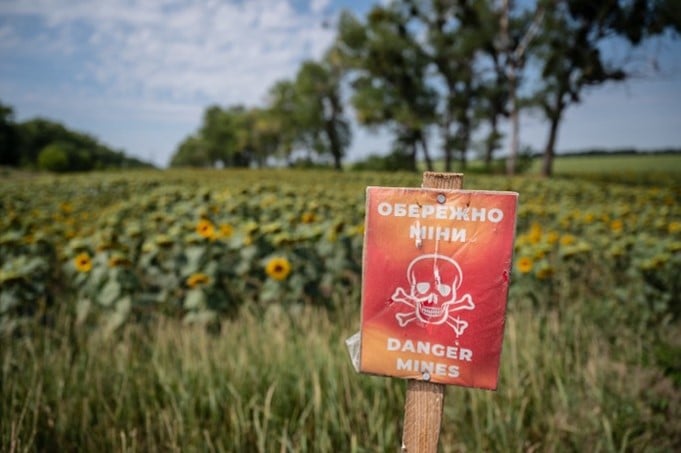November 27, 2025 | 22:24 GMT +7
November 27, 2025 | 22:24 GMT +7
Hotline: 0913.378.918
November 27, 2025 | 22:24 GMT +7
Hotline: 0913.378.918
The programme aims to prevent Ukraine from requiring food assistance in the long term.

The new programme aims to safely release land back to productive use, including by clearing it from mines and other explosive remnants of the war.
The Food and Agriculture Organization of the United Nations (FAO) and the World Food Programme (WFP) have launched a joint programme in collaboration with mine action partner Fondation Suisse de Déminage (FSD) to support smallholder farmers and rural families most affected by the war.
The programme has already started in Kharkivska oblast, and will later expand to Mykolaivska and Khersonska oblasts, focusing on farmers with land plots smaller than 300 hectares as well as rural families growing food for their own consumption.
The programme is designed to safely release land back to productive use, including by clearing it from mines and other explosive remnants of the war, to help restore agricultural livelihoods, contribute to Ukraine’s economic recovery, and phase out the need for humanitarian assistance for thousands of rural families.
The war has damaged Ukraine’s agriculture and food production, disrupted supply chains and exports, increased production costs, and caused widespread mine contamination.
According to the Rapid Damage and Needs Assessment, published in February 2023, Ukraine’s production of grain and oilseeds decreased by 37 percent in 2022. Almost 90 percent of small-scale crop producers surveyed by FAO in Ukraine reported a decrease in revenue due to the war, and one in four reported having stopped or significantly reduced their agricultural activity.
“Making the land safe and free of explosive remnants of the war is the first step to rebuilding resilient and prosperous rural communities in Ukraine, who have been on the frontlines of this war, and preventing their long-term dependence on humanitarian assistance,” said Denise Brown, the UN Humanitarian Coordinator in Ukraine.
“Many families and small-scale farmers in front-line regions are not planting this season because they know their fields are dangerous or they are risking their lives to plant on mined lands or contaminated soils,” noted Pierre Vauthier, Head of FAO Ukraine Country Office. “We expect that the soil rehabilitation, remediation and conservation techniques conducted will support people’s return to farming, and restore rural livelihoods while helping to sustain Ukraine’s agricultural production.”
“Without urgent action, agricultural production in Ukraine will continue to collapse, with direct consequences on food security and diet diversity in the country, and potential ripple effects on regional and global markets,” said Matthew Hollingworth, WFP Representative and Country Director in Ukraine.
FAO, WFP and FSD in close coordination with communities, local authorities and the Ministry of Agrarian Policy and Food of Ukraine, will first identify and map lands that require demining by using satellite imagery. In the second phase, demining teams will survey and clear lands from mines and other explosive remnants of the war, prioritizing plots that can be quickly released with minimal clearance work. In the third phase, FAO and FSD will test soils to assess contamination by pollutants left behind by exploded weapons. FAO and WFP will simultaneously survey small farmers and rural families on the types of inputs and resources they need to restart agricultural production, and will provide direct in-kind or cash support where possible.
To date, the $100 million project is facing a funding gap of $90 million. FAO and WFP estimate potential annual savings of up to $60 million in direct food assistance to rural communities. The project has been supported by the Ukraine Humanitarian Fund, a UN pooled fund, as well as private donors.
(FAO.org)

(VAN) A new study reveals how the simultaneous effects of ocean acidification, salinity and loss of oxygen are making the world more fragile.

(VAN) Hopes are growing that the creation of the first 3D turkey gut model could be a turning point in the battle against the virulent blackhead disease.

(VAN) Tyson, America’s biggest meat supplier, plans to shutter one of its largest beef processing plants as the industry continues to struggle with low cattle supplies and political pressure from Washington.

(VAN) New FAO study shows how digital solutions are empowering farmers and fishers to prevent losses and build resilient agrifood systems.

(VAN) Brazil's COP30 presidency pushed through a compromise climate deal on Saturday that would boost finance for poor nations coping with global warming but that omitted any mention of the fossil fuels driving it.

(VAN) Poultry farmers in the UK have been warned that they could face one of the worst winters yet for bird flu.

(VAN) Prices of main-crop paddy have risen sharply, with jasmine rice hitting 16,100 baht per tonne — the highest level in years.